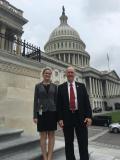Friday, July 28, 2017
By:
One of the many things I love about working on the Hill is the incredible opportunities it presents outside of my regular work schedule. A couple of weeks ago, Riley found out about an event for congressional staff and Members at the Library of Congress-- an after-hours scavenger hunt! Since it sounded like way too much fun, we put together a team of SPS interns and headed over Tuesday evening. The clues had us rummaging through a WWI soldier's trunk of belongings, identifying the professions of putti scattered throughout the building, playing Library of Congress trivia, and running through the Main Reading Room (where we were actually allowed to take photos). The library did a fantastic job engaging everyone with the various exhibits, and it was a wonderful way to spend an evening.
Wednesday was quite busy, but we started off with my favorite hearing of the summer: STEM and computer science education, focusing on the dearth of eligible employees to fill the every-growing field of computer science. It’s a well-known fact that a degree in computer science opens up great opportunities, but I was shocked by the actual numbers: 600,000 high-paying tech jobs in the US were left unfilled in 2015; by 2018 tech is projected to make up 51% of all STEM jobs; 49% of all jobs in the top quartile of earnings value coding skills; yet only 40% of K-12 schools offer computer science courses, and even fewer count them towards class credit. I thought the hearing was very productive and interesting, as the expert witnesses outlined different tactics to take in order to bridge the gap. Witnesses included the Chief Academic Officer of code.org, the Executive Vice Chancellor and Provost of U.C. Berkley, and the Executive Director of the Micron Technology Foundation, and although they all had slightly different approaches to tackling the problem, everyone was in agreement that the lack of adequate computer science education presents a serious threat to U.S. productivity.
As soon as the hearing was over I ran over to the Capitol for a career event hosted by the American Chemical Society, the Congressional Chemistry Caucus, the American Chemistry Council, and the National Association of Chemical Distributors. Surprise: it was about chemistry! But it mostly focused on the countless career paths a scientist can pursue. NASA Astronaut Tracy Caldwell Dyson described her childhood and young adulthood working on electrical engineering with her dad, and how throughout her Ph.D. work in chemistry she was always convinced that she would, somehow, end up as an astronaut. And she did! I was particularly heartened to hear about her struggles with calculus—it took her three tries to pass with a grade higher than a D! It goes to show that while grades are important they definitely are not the defining factor for success.
A brief speech from Congressman John Moolenaar (R-MI) especially resonated with me as he talked about his journey through college when, like me, he realized that while he loves chemistry he particularly enjoyed the people aspect of his major: communicating science and working directly with people rather than sitting in a lab performing research. At that point he started to look beyond traditional avenues for chemistry majors, and eventually ended up in the House of Representatives. I got to talk to him afterwards and get his advice for a science major who doesn’t want to “do” science.
Finally, Bill Provine, CEO and president of Delaware Innovation Space, and Dana Sedin, of New Belgium Brewing Company, shared how their science degrees have helped them in the business world. As someone who is looking for a career outside of academia, it was refreshing to be reminded of the endless possibilities there are, and how you don’t necessarily have to have your entire life planned out at the onset. I particularly enjoyed hearing from other science majors about the advantages and disadvantages of their backgrounds—so much was so relatable. They complained about the difficulties of talking science with coworkers who may have little familiarity with certain concepts and they emphasized the importance of learning to communicate effectively. One other important point the panelists made was how much their scientific training has helped them outside of the scientific community. When asked how often they he used the skills he'd learned in college, Rep. Moolenaar replied immediately, "Oh, every day!" As he explained, science teaches you to think critically and logically, seek out every angle of a debate, and problem solve like a champion.
Then this morning Riley and I had a very special breakfast with Dr. John Mather and Rep. Bill Foster. Dr. Mather is, of course, the Nobel laureate who very generously sponsors our internship, and Rep. Foster is the only Ph.D. scientist (and only physicist) in Congress. We all met up in the members-only House restaurant, where we passed a wonderful 90 minutes discussing both politics and science. As you would expect, it was a lively conversation ranging from AI to the James Webb Space Telescope. Although Rep. Foster had to duck into the House Chamber for a quick vote after breakfast, he met up with us again two minutes later to take a couple photos before heading out!
What a week!
Eleanor Hook



